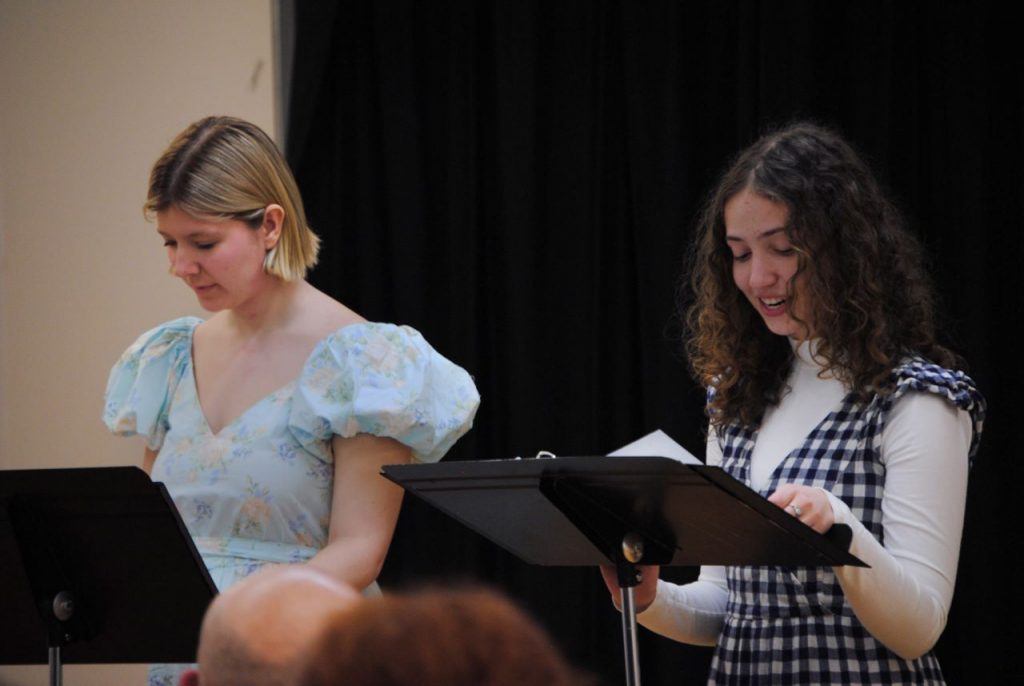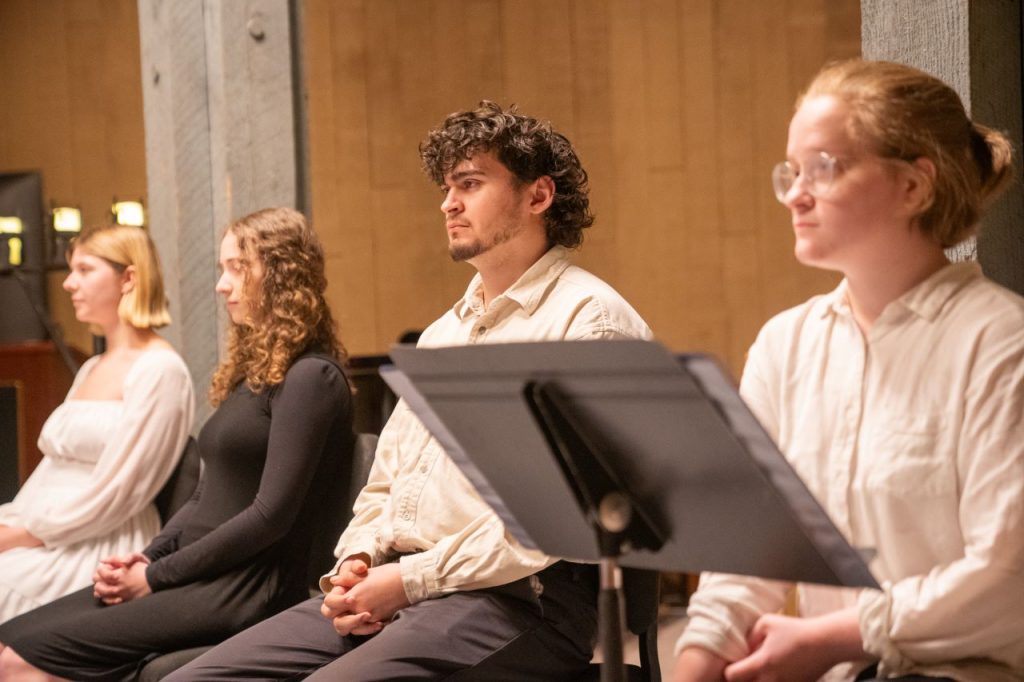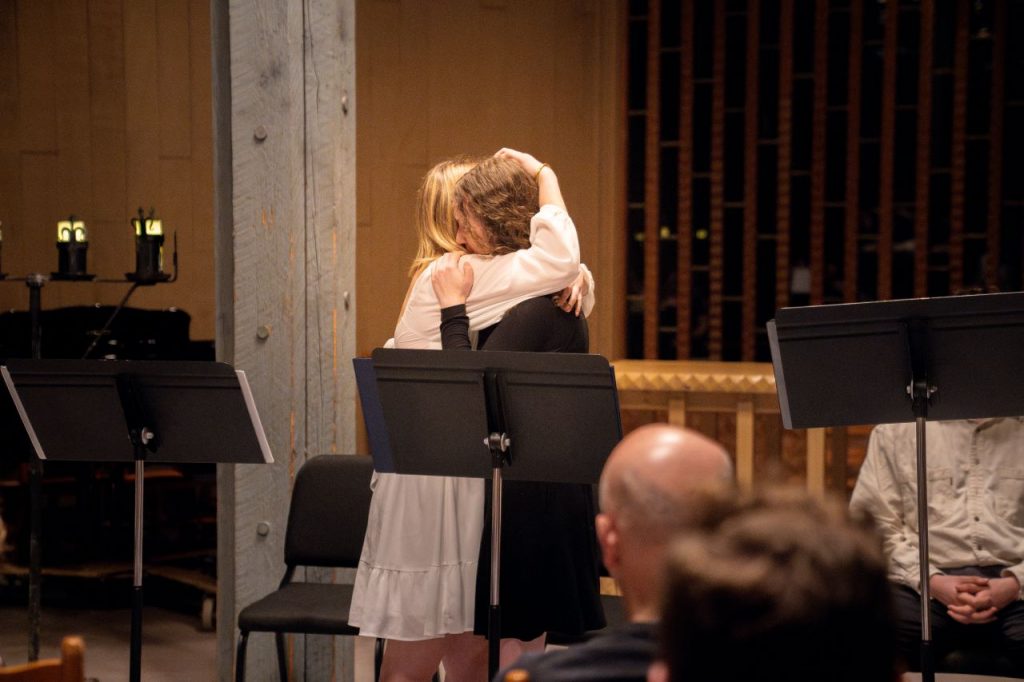BY EMILY LANDOLFI ’27

“To love or to survive.”
Marthe Brossier – the headstrong protagonist of Georgie Svrcek’s (’25) Demonized – takes audiences on a journey riddled with lies, heartbreak, and sacrifice. The play depicts a sapphic relationship torn apart by oppressive societal standards under the guise of a witch hunt, exploring what it means to be a queer woman in the early 1600s. The first reading occurred in Skidmore Theater’s Studio B on February 12th, followed by a revamped performance with the updated script in the Wilson Chapel on April 29th.
The play opens with Marthe Brossier (Becca Durst’ 27) praying alone and Kit Simpson (’27) narrating stage directions. She stands with her eyes closed and hands clasped together as a buzzing crowd overtakes the space, stopping when Marthe opens her eyes and addresses the audience. She transports viewers to Romorantin, a small village in Central France circa 1598, and provides a crucial backstory preliminary to the plot ahead. She maintains a personal connection to the audience throughout the show, jumping in at moments to offer clarity and her internal monologue, making her motivation to tell her tale clear: to confess.
Her father Jacques (Lucas Gordon Vera’ 26) enters the scene, and the strained relationship between him and Marthe is evident from the beginning. She is the third child of the Brossier family and lost her mother during childbirth, forced to grow up under the roof of a gambling, rageful alcoholic. She wistfully states, “It was a lonely existence for many years, with only my thoughts to accompany me.” In a twist of fate, her household befriends another, one that includes Anne Chevreaux (Andie Alcron ’25), and the two become quick friends. They spend days and nights gallivanting about and partaking in thrilling adventures. However, Marthe soon realizes her feelings for Anne are romantic and reciprocated, and the two share a tender kiss. The only caveat is their village, one that is devoutly religious and views homosexuality as perverse. Marthe and Anne recognize the hypocrisy and falsehood of their community’s perspective, firmly believing that the same God who created them to love will not punish or shame them. Nevertheless, they conceal their affection for one another from the public in fear of persecution; they are destined to be together but forced into a forbidden love.

Years pass, and the two continuously meet secretly in the woods. Their blissful happiness, however, does not last for long. Amidst a rendezvous, Anne shares heartbreaking news – townsperson Nicolas Toucy (Lucas Gordon Vera’ 26) has proposed to her. Though Nicolas was courting her, she never suspected he would pursue her further as he seemed keen on Marthe’s sister. A shock to Marthe and Anne, the two engage in a passionate, love-infused fight. Anne tries to explain how advantageous the marriage would be for her and her family, attempting to convince Marthe they can still be together despite her loveless matrimony. However, Marthe insists that the only way for their love to continue is if they flee away from their families, the voices damning their love. Despite her pleas, Anne refuses for fear of getting caught by their people and the immoral punishments they’d face. In a fit of devastation, Marthe hurries home and makes a life-altering decision – to run away.
Without her lover’s support, Marthe is fueled by loneliness and despair, cutting her hair with a pair of shears and changing into masculine garb to strip herself of femininity – a disguise for her sex. She declares she can no longer be Marthe Brossier and sets off to surrounding towns in the dead of night with only a water-filled leather bottle and a satchel of food for survival. A day into her journey, she is harassed by a random passerby named Paysan (Lucas Gordon Vera 26), who is fooled by her boy-like appearance. She attempts to hurry on by him, but he whips out a dagger from his belt and presses it against her neck, ordering her to empty the contents of her bag and strip from her cloak. In a last effort to escape his clutches, she begins to move away hurriedly but is not quick enough. He shoves her back and feels under her shirt, realizing that the boy he is robbing is no boy at all. With Marthe’s guise revealed, Paysan, a predatory and vile man, drags Marthe offstage to rape her.
When Marthe returns, there’s an emptiness in her eyes and an air of despair. She furthers her journey, stopping in a nearby village without the shield of her cloak in the hope of haven, but is discovered and forced to return to Romorantin. Jacques forbids her from leaving her house and refuses to speak to her, causing Marthe to process her trauma in isolation until, in the name of love, Anne comes knocking on her door. With Anne’s concern and warming presence, Marthe confides in her and begs once more for her to join in spinsterhood, confessing, “You are all that I have left.” Pained, Anne admits she has accepted Nicolas’ proposal based on familial obligation, and Marthe, overcome by the pain she’s endured, talks of ways she will end her life. She feels she cannot bear to watch Anne with another and accuses her of betrayal and wickedness. To prove her feelings, Anne pulls Marthe in for a passionate kiss that is interrupted by Jacques, catching them in the act and demanding an explanation for their “sinful act.” Anne tries to cover up their relationship by claiming Marthe is “unwell,” but stuck in a haze, Marthe does not play along as hoped. In a messy and chaotic clash between the three, Anne runs from the Brossier house, and Jacques manipulates Marthe into stating that Anne has bewitched her.

Confused, delirious, and psychologically puppeteered by her father, Marthe pretends to be possessed at church the following day and publicly denounces Anne as a witch; Jacques calls for Anne to be seized, and the village crowd descends upon her. Jacques begins to make arrangements, calling upon Claude Foulon (Lucas Gordon Vera ’26) – the priest of Romorantin – to perform an exorcism on Marthe to vanquish the “demon” that takes over her. Marthe puts on a convincing show when Foulon force-feeds a repulsive liquid down her throat and she resists him. Although her anguish is true, it is mistaken as an evil entity holding onto her spirit. Amidst their first meeting, Marthe feels an overwhelming sense of power and awakening as the pain swelling inside her is finally released. When the day of her public “exorcism” arrives, their act is finely tuned, fooling the masses into thinking that Marthe’s “deviant” behavior is not her own. She sees this as an opportunity to reclaim her family’s honor, and for the first time, feels as if her pain is worth a greater reward: “All the pain I had endured, all the injustices of the lot I had been given; all of it now had some means of release and they adored it.”
Though the exorcism in front of the Romorantin-folk should have been enough, Jacques decides to profit economically from Marthe’s “demon” by sending her and Claude on tour through neighboring villages where they perform their believable “act.” As their trips continue, the story of the women bewitched reaches the highest members of society who, for their considerable efforts to tame the “demonized,” invite them to extravagant gatherings. At one of these parties, Marthe is approached by aristocrats Odette de la Roche (Andie Alcron’ 25) and Pierre de Laval (Lucas Gordon Vera’ 26), who at first appear kind and welcoming, though quickly begin to demean and shame Marthe. In anger, Marthe releases the “demon” and its fury to establish her power and control, making the dignified sectors of society feel small. She basks in the reverence all of France has bestowed upon her and when she reaches Paris, she is the most well-known figure in the country.

However, everything comes crashing down when she learns Anne is sentenced to death for sorcery and possession. Marthe rushes back to Romorantin and visits Anne in jail, led by the prison Garde (Lucas Gordon Vera ’26), who believes Marthe is there to confront rather than save her. When she and Anne are left alone, Marthe starts to devise a plan to rectify her mistake, but it is too late – Anne has confessed. After being tortured relentlessly, Anne decided to stop defending her innocence and give into the narrative spun by the town to relinquish her pain. Marthe begins to weep and beg for forgiveness, yet Anne has already done so. She tells her that Marthe’s soul is good, and as the two hold on to each other, they recall how they fell in love. In the end, Marthe decides to die alongside Anne, choosing love over life. Anne further remarks, “They can prick us, they can beat us, they can burn us, but no man can command the contents of our hearts.” The show ends with a final monologue: Marthe solidifying that she is a flawed protagonist with a simple goal: change. She hopes for the world to accept love like hers, believing that one day, all forms of love can live without persecution.
Demonized allows a modern audience to see how homosexuality was treated in a historical context, as homosexual relationships have always existed; they just weren’t accepted. The play explores the extent to which one is willing to go for love and the loss of living truthfully due to an oppressive society. Though we are indeed more progressive than those of the 16th century, we see today how deadly homophobia and misconstrued religious values can be and the crucial need to protect and support the LGBTQ+ community. Svrcek created a historical and relevant play with in-depth characters that audiences cannot help but tear up for.
Photos by Jordan Azzinaro ’26 and Logan Waugh ’26
***
Emily Landolfi ’27 is a staff writer for the Skidmore Theater Living Newsletter
